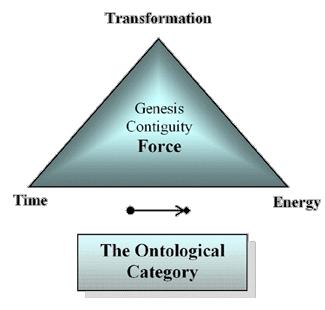
 The Greek word 'ontos', which means 'being' in the nominitive sense, comes from the verb 'einai', 'to be'. The Latin word related to the Greek 'ontos' is 'ens', which gives us our word 'entity'. Thus Onotology is the study of Beings or Entities. Now, the irreducible Infinitude of the Syzygy implies that there will always be more than one Entity, a situation that is typically denoted in Metaphysics by the term 'concrete', which literally means 'grown together'. And due to the Ontological Category, whatever exists concretely must entail two aspects, and does so for each of these aspects in two different forms. The first of these aspects is 1) Sameness or Autopoiesis—and in its first form this aspect gives an entity its Self-Sameness, or a certain amount of Invariance; while in its second form it provides entities with Other-Sameness, to allow for more than one Entity of a kind (that is, to make it part of a class or natural kind). The second aspect is 2) Difference or Allopoiesis—and in its first form it gives an entity its Self-Difference, to accommodate the idea of the transformation of an entity (that is, growth and decay); while in its second form it provides entities with Other-Difference, to allow for more than one natural kind of Entity (that is, to allow for such higher-order kinds as genus, phyla, families, etc., which are the higher structures posited by the natural sciences). The Greek word 'ontos', which means 'being' in the nominitive sense, comes from the verb 'einai', 'to be'. The Latin word related to the Greek 'ontos' is 'ens', which gives us our word 'entity'. Thus Onotology is the study of Beings or Entities. Now, the irreducible Infinitude of the Syzygy implies that there will always be more than one Entity, a situation that is typically denoted in Metaphysics by the term 'concrete', which literally means 'grown together'. And due to the Ontological Category, whatever exists concretely must entail two aspects, and does so for each of these aspects in two different forms. The first of these aspects is 1) Sameness or Autopoiesis—and in its first form this aspect gives an entity its Self-Sameness, or a certain amount of Invariance; while in its second form it provides entities with Other-Sameness, to allow for more than one Entity of a kind (that is, to make it part of a class or natural kind). The second aspect is 2) Difference or Allopoiesis—and in its first form it gives an entity its Self-Difference, to accommodate the idea of the transformation of an entity (that is, growth and decay); while in its second form it provides entities with Other-Difference, to allow for more than one natural kind of Entity (that is, to allow for such higher-order kinds as genus, phyla, families, etc., which are the higher structures posited by the natural sciences).
|

